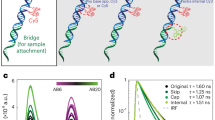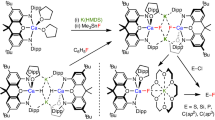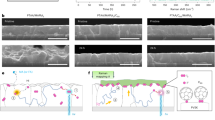Abstract
Willard and Dean1 have described a polarographic method for the determination of aluminium, based on the measurement of the polarographic step produced by the reduction of ‘Solochrome Violet R.S.’ (sodium salt of 5-sulpho-2 hydroxy-α-benzene azo-2 naphthol), which is known as ‘Pontachrome violet S.W.’ in the United States. This compound produces a step of half-wave potential about 0.3 V. vs. the saturated calomel electrode in an acetate buffer solution of pH 4.6. Addition of aluminium to a solution of this dye causes this polarographic step to be reduced in height and a second step to appear at a point about 0.2 V. more negative. The sum of the height of these two steps is equal to the height of the original step, and the size of the second step is proportional to the concentration of aluminium present.
This is a preview of subscription content, access via your institution
Access options
Subscribe to this journal
Receive 51 print issues and online access
$199.00 per year
only $3.90 per issue
Buy this article
- Purchase on Springer Link
- Instant access to full article PDF
Prices may be subject to local taxes which are calculated during checkout
Similar content being viewed by others
References
Willard, H. H., and Dean, J. A., Analyt. Chem., 22, 1264 (1950).
Author information
Authors and Affiliations
Rights and permissions
About this article
Cite this article
MACNULTY, B., REYNOLDS, G. & TERRY, E. Polarographic Determination of Fluoride. Nature 169, 888–889 (1952). https://doi.org/10.1038/169888b0
Issue Date:
DOI: https://doi.org/10.1038/169888b0
This article is cited by
-
Polarography of Solochrome Violet RS-Metal Complexes at High pH
Fresenius' Zeitschrift für analytische Chemie (1966)
-
The polarography of azo dyes and their metal complexes
Fresenius' Zeitschrift für analytische Chemie (1966)
-
The polarography of aluminium
Fresenius' Zeitschrift f�r Analytische Chemie (1960)
-
Zur elektrochemischen Schnellanalyse des Aluminiums in Aluminatlaugen
Fresenius' Zeitschrift für analytische Chemie (1956)
Comments
By submitting a comment you agree to abide by our Terms and Community Guidelines. If you find something abusive or that does not comply with our terms or guidelines please flag it as inappropriate.



